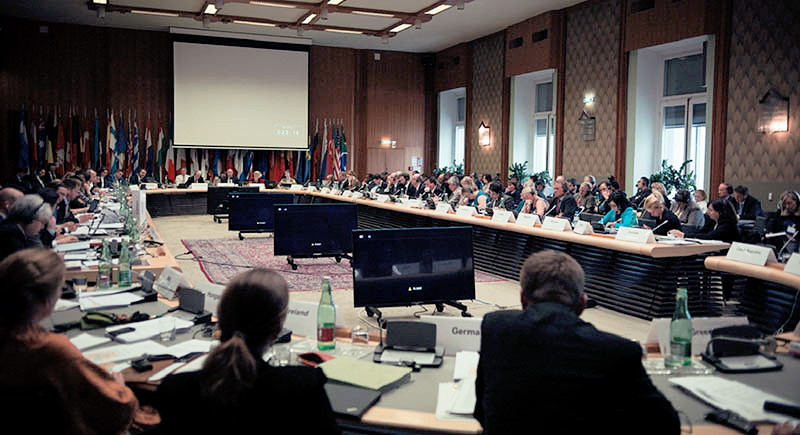INDIAN ARMED FORCES CHIEFS ON
OUR RELENTLESS AND FOCUSED PUBLISHING EFFORTS

SP Guide Publications puts forth a well compiled articulation of issues, pursuits and accomplishments of the Indian Army, over the years

I am confident that SP Guide Publications would continue to inform, inspire and influence.

My compliments to SP Guide Publications for informative and credible reportage on contemporary aerospace issues over the past six decades.
- Prime Minister witnesses 'Bharat Shakti' – a Tri-Services Firing and Manoeuvre Exercise in Pokhran, Rajasthan
- Interim Defence Budget 2024-25 — An Analysis
- Union Defence budget 2024
- Prime Minister Modi Commemorates Indian Navy Day in a Grand Ceremony
- Prime Minister Modi Flies in the LCA Tejas
- New Chapter in India-Italy Defence Ties
- Airpower beyond Boundaries
India becomes member of Wassenaar Arrangement

After much wait, India, during the plenary of the participating states at Vienna, becomes the 42nd member of the global dual use technology group ‘Wassenaar Arrangement’ (WA) on December 8.
India was represented by Ambassador Renu Pall, who exchanged letters with the 2017 Plenary Chair of WA, Ambassador Jean-Louis Falconi of France, formalizing India’s membership. The Plenary meeting of the WA was held on 6-7 December. With this India has moved one step ahead in the global high table of weapons trade.
The idea behind this elite export control regime is to have control over the transfers of dual-use goods and technologies. Last year, India joined Missile Technology Control Regime (MTCR), which allows export and import of missile and drone with range of over 300 kms.
Thanking the participating states for their support, India in a statement said, "India’s entry into the Arrangement would be mutually beneficial and further contribute to international security and non-proliferation objectives."
Appreciating the support of France and Japan, who were the co-rapporteurs of India’s membership, India thanked Ambassador Philip Griffiths, Head of WA Secretariat, for his guidance during the preparatory process.
The arrangement works through export controls on items included in the WA control lists through legislation by participating states. It is expected of the participating states to "report on transfers and denials of specified controlled items to destinations outside the Arrangement."
The items are listed in a ‘Control Lists’ with 22 main entries on military items, better known as ‘Munitions list’ which includes small arms and light weapons (and related ammunition), tanks and other military armed vehicles, armoured equipment, aircraft and unmanned airborne vehicles, aero engines and related equipment.
In another list, WA lists dual-use goods and technologies in nine categories and sensitive and very sensitive list.
Inclusion of India in the WA has strengthened its claim to the membership of the 48 members Nuclear Supply Group which controls the global nuclear trade.
China has been blocking Indian membership to NSG on the pretext of not being signatory to Nuclear Proliferation Treaty. India is also trying to get membership of Australia group, an informal forum of countries created in 1985, to restrict export which can contribute to proliferation and development of chemical or biological weapons.
Under ‘Make in India’ initiative government is pushing Indian firms to design and develop cutting edge weapons for the requirements of Indian forces. In many areas of dual-use technology, Indian companies are winning global contracts and therefore it was pertinent for India to become part of WA.
Similarly, after becoming member MTCR, India can now export its long range existing and upcoming cruise missiles.
On April 24, Director General of Foreign Trade(DGFT) added ‘Category 8’ to its SCOMET (Special Chemicals, Organisms, Materials, Equipment and Technologies) list which includes special materials, material processing, electronics, computers, telecommunications, information security, sensors and lasers, navigation and avionics, marine, aerospace and propulsion. Since, these material and processes, although primarily of civilian use, can also be utilized in manufacturing of weapons of mass destructions, are controlled by the government through a strict export regime.
By bring the WA control list items into its SCOMET list, India became in line with the WA, paving its way for inclusion in the group. Unlike other control regimes, WA primarily deals with conventional arms and weapons whereas others deal primarily with WMDs.
WA was established on November 16, 1993 in Hague by the representatives of the 17 COCOM (Coordinating Committee on Multilateral Export Controls) member states who agreed to terminate COCOM, and establish a new multilateral arrangement, temporarily known as the "New Forum" which was formalized on December 19, 1995 at Wassenaar, Netherlands.
The participating states of the Wassenaar Arrangement are Argentina, Australia, Austria, Belgium, Bulgaria, Canada, Croatia, Czech Republic, Denmark, Estonia, Finland, France, Germany, Greece, Hungary, India, Ireland, Italy, Japan, Latvia, Lithuania, Luxembourg, Malta, Mexico, Netherlands, New Zealand, Norway, Poland, Portugal, Republic of Korea, Romania, Russian Federation, Slovakia, Slovenia, South Africa, Spain, Sweden, Switzerland, Turkey, Ukraine, United Kingdom and United States.





